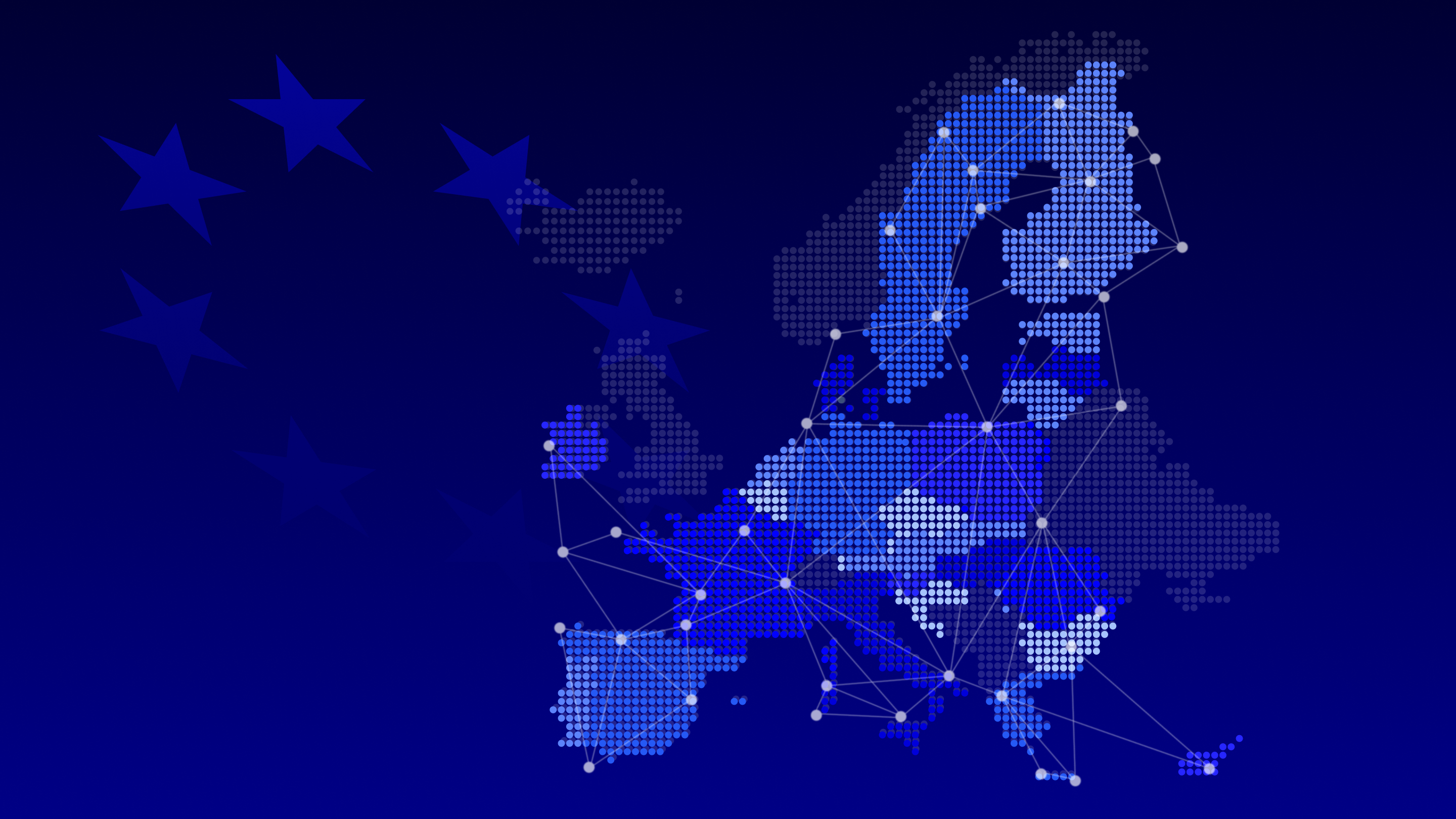TL;DR:
The IOTA Foundation has successfully completed the final phase of the European Blockchain Pre-Commercial Procurement. Alongside our fellow finalists Chromaway and Billon, we’ve developed pre-commercial products for Intellectual Property Rights Management and Digital Product Passports, demonstrating scalability and sustainability. We are now in conversations with commercial partners to further support and drive this important European initiative in its new governance form as EUROPEUM-EDIC.
We’re thrilled to announce that IOTA has successfully completed the third and final phase of the European Blockchain Pre-Commercial Procurement (PCP).
In 2021, we were selected as one of seven projects from 30+ applications to participate in the European Blockchain PCP, funded by the European Commission. The PCP aims to design new DLT solutions for Europe – first to be integrated into the European Blockchain Services Infrastructure (EBSI), an open, permissioned network of blockchain nodes across Europe that supports cross-border credential attestations for individuals and organizations; then as part of the next evolution of EBSI, the European Digital Infrastructure Consortium for Blockchain (EUROPEUM-EDIC), which will provide next-generation infrastructure to support scalable, energy-efficient, and secure blockchain applications.

Since this journey began in 2020, we’ve documented every phase – in our announcements for Phase 1, Phase 2A, andPhase 2B, as well asmaterial like leaflets. Now, along with our partners Digimarc, Universidad Politécnica de Catalunya, Musika Peripherika,Software AG,and Uncommon Digital, we are excited at the opportunity to apply the learnings and further develop the prototypes created during the PCP to bring them to market.
What We Built: Overview of the IOTA-EBSI Solution
The solution we’ve developed for the European Blockchain PCP combines our DAG-based Tangle distributed ledger technology with open-source building blocks, open APIs, and potential third-party platforms in the future European Blockchain services ecosystem.
- Core DLT Layer: Built on the Stardust version of the Tangle protocol, this layer uses a Decentralized Coordinator with a Proof-of-Authority consensus mechanism involving EU member states and institutions. It includes IOTA Node Extensions (INX) for recording transactions related to identities and audit trails on the ledger, ensuring decentralization, efficiency, and interoperability with a single endpoint and simplified Core Node. The solution scales thanks to our “Tangle Tree” data sharding concept (see more below) and IOTA Smart Contract Chains that are EVM-compatible.
- Satellite Systems: These systems link third-party platforms through IOTA-EBSI connectors and feature an Auditable Item Graph for object traceability and composability capturing digital twins of physical or digital objects – a key ingredient of our Digital Product Passport prototypes (see below).
What We Built: Solution Prototypes
As part of our involvement in the PCP, we developed new solution prototypes with our partners.

Intellectual Property Rights (IPR) Management: By using smart contracts, NFTs, and decentralized identities (DIDs) in an IPR Marketplace accessible via an EU Digital Identity-compatible credential wallet, we automate and ensure fair, transparent royalty payments for music in films. Read more here.

Digital Product Passports (DPP): We developed solution prototypes for an Electronics DPP, tracking device life cycles from manufacturing to recycling, and Plastics DPP, recording the transformation of agricultural plastic waste into bioplastic.
IOTA’s Innovations Tested in PCP
IOTA successfully developed and demonstrated its tech advancements across the following categories:
-
Scalability
We’ve demonstrated the capability of the Tangle at the largest and most diverse scale yet, including under adverse conditions. With 30 full entities (each one corresponding to an EU member state) and one Decentralized Coordinator (DeCoo) node each, we created a testing environment of around 100 nodes deployed across various cloud providers and 12 geographical regions. We also found that the Hornet Node software can handle at least 80K reads per second with small-size payloads.We developed our Tangle Tree sharding concept and demonstrated its capacity for exponential scalability – branches of the Tangle connected in a parent-child relationship to other branches. Testing it across 100 Tangles, we reached approximately 90K confirmed transactions per second, aligning with the PCP’s ambitions for transaction rate and scalability.
-
Sustainability
We developed a new methodology to assess the energy consumption of a complex Stardust setup; in the first application of the methodology, we were able to demonstrate that energy consumption scales logarithmically (i.e. much slower than linearly) with the number of transactions.
-
Security and Privacy
We ensured compliance with industry standards for security and privacy by aligning with CISA, NSA, and NISTrecommendations.We developed our Quantum-Resistant Cryptographic roadmap with a prototype using CRYSTALS-Dilithium signatures for quantum-ready signature schemes and Decentralized Identity verification methods.
-
Object Identification and Data Processing
Our solution implements an auditable item graph to track objects and their historical data. The graph consists of descriptive digital twins of items auditable through the IOTA ledger, as well as linked data and multiple vocabularies (such as schema.org, GS1 Web Vocabulary, and the UN/CEFACTbuy-pay-ship vocabulary), and a Web UI for demonstration purposes. -
Robustness and Technical Maturity
Our work in the European Blockchain PCP helped make our solution even more robust, with comprehensive API documentation, disaster recovery plans, interoperability with other blockchains – including EVM-compatible blockchains and others offered by the PCP – and integration with external data sources, such as MongoDB and IPFS. Furthermore, our solution utilizes and adheres to multiple international standards, including ISO/IEC 21000-23 standard and OpenID4VP for the use cases.
The Future Beyond EBSI
Completing the European Blockchain PCP is just the beginning. An IOTA-EBSI Sandbox is designed to continue the development of the pilot use cases, with a focus on having a complete set of functionalities. This sandbox is available for the EU member state authorities and EBSI projects to experiment with.
As EBSI evolves into EUROPEUM-EDIC, we aim to establish a partnership with this new entity. Adopting our PCP results, including the DPP and IPR Management prototypes, within EUROPEUM-EDIC will further enhance the European blockchain ecosystem.
Advancing Commercial Adoption Together
We’re also now in conversations with partners, governments, and governmental agencies to help scale our solution and use cases into commercial products – just like the recently announced Eviden Digital Passport Solution, the first market-ready DPP solution to use IOTA technology to track the lifecycle of automotive batteries.
According to Dominik Schiener, Chairman of the IOTA Foundation: “EBSI is a crucial step towards a cohesive digital future for Europe, providing the necessary framework for innovation and collaboration across various sectors. This initiative aligns with our goals and strengthens Europe’s position in the global digital landscape”.
Participating in the European Blockchain PCP has allowed us to develop and showcase scalable, sustainable, and secure solutions for Europe’s blockchain future. Our work in this initiative highlights IOTA’s commitment to enhancing Europe’s digital infrastructure. IOTA
Links in this Article
IOTA Foundation Resources
- EBSI: Building a Distributed Ledger Technology for Europe
- IOTA Selected for Phase 2 of the EU Blockchain Pre-Commercial Procurement
- IOTA Enters Next Phase of EU Blockchain PCP
- IOTA x EBSI Leaflet
- IOTA’s Stardust Upgrade and the Evolution of $IOTA Tokenomics
- IOTA Node Extensions INX
- Smart Contracts, Smarter Rights
- Digital Product Passports for Electronics
- Transforming Plastic Waste with DPPs
- Introducing EPCIS 2.0
- Introducing Eviden Digital Passport Solution Powered By IOTA
- Auditable Item Graph Web UI
European Commission and EUDI Resources
- European Commission Press Release: Blockchain: Creation of EUROPEUM-EICD
- EUDI Wallet: EUDI Architecture and Reference Framework.
Industry Standards and Specifications
- schema.org
- GS1 Web Vocabulary
- UN/CEFACT
- ISO Standards
- OpenID
Governmental and Security Resources
- CISA
- NSA
- NIST
- Digimarc
- Universidad Politécnica de Catalunya
- Musika Peripherika
- Software AGUncommon Digital
 iota-news.com
iota-news.com
